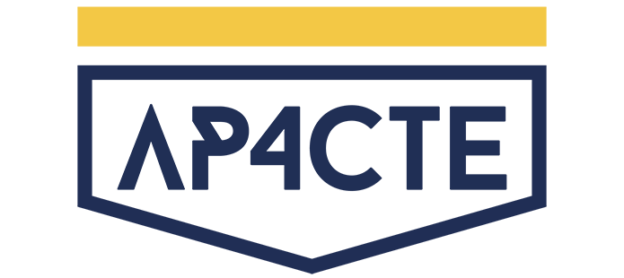
John M. Harris, Stacy Cabrera, and Kelly Cooper discuss AP for CTE Seminar on the podcast Future Groove.
Dear Teacher,
This website is organized to help you harness the potential of AP Seminar for your Career Technical Education (CTE) students, providing you with a step-by-step guide as we collaborate in building your inquiry-focused, college-level program and position your high schoolers as experts across special topics. Last year, ap4cte.org teamed up with Stacy Cabrera, a recognized expert in designing and teaching AP Seminar, to map out a two-year AP Capstone program tailored to students in CTE pathways. Checkpoints throughout this guide support you as you begin to frame learning around prompting students to ask critical questions, evaluate sources, mediate content across a variety of platforms, and ultimately delve into a research question that addresses a real-time industry issue in a discipline area of interest.
You are a thought partner in the AP Seminar experience as you practice connecting CTE skills to academic research in a building-block process that promotes trial and error and ongoing discovery over traditional models of content intake and regurgitation. Through practice skills aligned to each AP Seminar course task, this free and fully accessible Open Education Resource aims to build a support network for you, regardless of your pathway sector, to join a community of practice as your school introduces the course to students. Paced tips provide examples of ways you can boost student engagement. Whether students are pursuing futures in culinary arts, advanced manufacturing, media arts, computer programming, biotechnology, alternative fuels or any number of project-based pathways, the goal is to advantage your learners and merge the practical applications of CTE skills with academia, eventually leading to your students citing AP peers’ work and networking as research experts.
The AP for CTE teacher’s course operates on an “embrace the chaos” perspective, with ideas to help you promote student ownership over material and nurture adaptability when existing literature may not support initial ideas and reevaluation is needed to push forward. You will note creative license taking hold as your students bridge favorite hands-on discoveries in CTE to in-depth academic discovery, and the teacher-student barrier fades; you will become a learner alongside your high schoolers who are investigating their interests. Our approach to AP Seminar celebrates and acknowledges a constellation of student and teacher CTE experiences, including work-based learning through mentorship, internships, job shadowing, externships, industry experience, conference attendance, field trips, and more.
In AP Seminar, your CTE students work in groups to collaborate in finding the best solutions to problems tailored to individual interests and aligned with pathway coursework. AP Seminar students are evaluated on several “tasks”: (1) completion of a team project and presentation; (2) an individual research-based essay and presentation with oral defense; and (3) taking a written end-of-course exam. Each area contributes to an overall process evaluation, with a score of at least “3” out of 5 considered successful completion of the course. (More detail here: https://apstudents.collegeboard.org/awards-recognitions/ap-capstone-award). You assess presentations while the College Board scores student-written components and the end of course exam. Scoring across deliverables mitigates the all-or-nothing, end-of-year stakes that many AP subject exams employ in test taking, and broadens access to opportunities for CTE students to be competitive as college applicants and in the workforce. Your AP Seminar students gain UC Honors points toward GPA, and several universities offer credit for successful completion of the course.
As the AP Seminar year progresses, you may decide to step back while students gain control of learning and grow more comfortable with setbacks and reentry to research and writing. College-level critical thinking progresses in AP Research, where problem solving, collaboration, writing and public speaking skills advance and students construct a 4,000 to 5,000 word academic paper they will present and defend. (There is no end of course exam in AP Research). Students who earn a minimum of “3” in both courses receive the AP Seminar and Research Certificate.
Your ap4cte.org resources include:
- Practice skills aligned to each course task
- Facilitation of CTE teacher communities of practice
- Special topics review
- Examples of student projects
- How to succeed primers throughout
- Blueprints to align CTE courses to more AP opportunities
- Inquiry-based examples to spark creativity and innovation
- Opportunities to build networks for students to showcase work
- Connect to an expert via ap4cte.org with one-to-one mentoring
